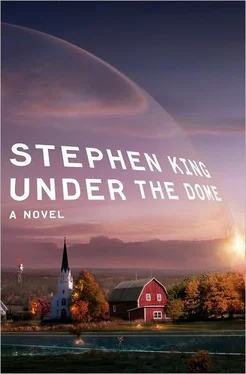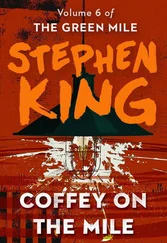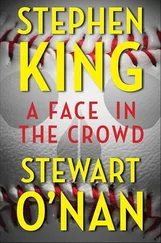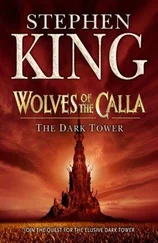She stood up. She had no flashlight, but anticipated no trouble finding her way outside with unbarked shins. She knew this place step for step and obstacle for obstacle. Loved it, too. She didn’t fool herself about either her lack of faith or her stubborn love of the idea itself.
“Come on, Clove,” she said. “President in half an hour. The other Great Not-There. We can listen on the car radio.”
Clover followed placidly, untroubled by questions of faith.
Out on Little Bitch Road (always referred to as Number Three by Holy Redeemer worshippers), a far more dynamic scene was taking place, and under bright electric lights. Lester Coggins’s house of worship possessed a generator new enough for the shipping tags still to be pasted on its bright orange side. It had its own shed, also painted orange, next to the storage barn behind the church.
Lester was a man of fifty so well maintained—by genetics as well as his own strenuous efforts to take care of the temple of his body—that he looked no more than thirty-five (judicious applications of Just For Men helped in this regard). He wore nothing tonight but a pair of gym shorts with ORAL ROBERTS GOLDEN EAGLES printed on the right leg, and almost every muscle on his body stood out.
During services (of which there were five each week), Lester prayed in an ecstatic televangelist tremolo, turning the Big Fellow’s name into something that sounded as if it could have come from an overamped wah-wah pedal: not God but GUH-UH-UH-ODD! In his private prayers, he sometimes fell into these same cadences without realizing it. But when he was deeply troubled, when he really needed to take counsel with the God of Moses and Abraham, He who traveled as a pillar of smoke by day and a pillar of fire by night, Lester held up his end of the conversation in a deep growl that made him sound like a dog on the verge of attacking an intruder. He wasn’t aware of this because there was no one in his life to hear him pray. Piper Libby was a widow who had lost her husband and both young sons in an accident three years before; Lester Coggins was a lifelong bachelor who as an adolescent had suffered nightmares of masturbating and looking up to see Mary Magdalene standing in his bedroom doorway.
The church was almost as new as the generator, and constructed of expensive red maple. It was also plain to the point of starkness. Behind Lester’s bare back stretched a triple rank of pews beneath a beamed ceiling. Ahead of him was the pulpit: nothing but a lectern with a Bible on it and a large redwood cross hanging on a drape of royal purple. The choir loft was above and to the right, with musical instruments—including the Stratocaster Lester himself sometimes played—clustered at one end.
“God hear my prayer,” Lester said in his growly I’m-really-praying voice. In one hand he held a heavy length of rope that had been knotted twelve times, one knot for each disciple. The ninth knot—the one signifying Judas—had been painted black. “God hear my prayer, I ask it in the name of the crucified and risen Jesus.”
He began to whip himself across the back with the rope, first over the left shoulder and then over the right, his arm rising and flexing smoothly. His not inconsiderable biceps and delts began to pop a sweat. When it struck his already well-scarred skin, the knotted rope made a carpet-beater sound. He had done this many times before, but never with such force.
“God hear my prayer ! God hear my prayer! God hear my prayer! God hear my prayer!”
Whack and whack and whack and whack. The sting like fire, like nettles. Sinking in along the turnpikes and byroads of his miserable human nerves. Both terrible and terribly satisfying.
“Lord, we have sinned in this town, and I am chief among sinners. I listened to Jim Rennie and believed his lies. Yea, I believed, and here is the price, and it is now as it was of old. It’s not just the one that pays for the sin of one, but the many. You are slow to anger, but when it comes, Your anger is like the storms that sweep a field of wheat, laying low not just one stalk or a score but every one. I have sowed the wind and reaped the whirlwind, not just for one but for many.”
There were other sins and other sinners in The Mill—he knew that, he was not naïve, they swore and danced and sexed and took drugs he knew far too much about—and they no doubt deserved to be punished, to be scourged, but that was true of every town, surely, and this was the only one that had been singled out for this terrible act of God.
And yet… and yet… was it possible that this strange curse was not because of his sin? Yes. Possible. Although not likely.
“Lord, I need to know what to do. I’m at the crossroads. If it’s Your will that I should stand in this pulpit tomorrow morning and confess to what that man talked me into—the sins we participated in together, the sins I have participated in alone—then I will do so. But that would mean the end of my ministry, and it’s hard for me to believe that’s Your will at such a crucial time. If it’s Your will that I should wait… wait and see what happens next… wait and pray with my flock that this burden should be lifted… then I’ll do that. Your will be done, Lord. Now and always.”
He paused in his scourging (he could feel warm and comforting trickles running down his bare back; several of the rope knots had begun to turn red) and turned his tearstained face up toward the beamed roof.
“Because these folks need me, Lord. You know they do, now more than ever. So… if it’s Your will that this cup should be removed from my lips… please give me a sign.”
He waited. And behold, the Lord God said unto Lester Coggins, “I will shew you a sign. Goest thou to thy Bible, even as you did as a child after those nasty dreams of yours.”
“This minute,” Lester said. “This second. ”
He hung the knotted rope around his neck, where it printed a blood horseshoe on his chest and shoulders, then mounted to the pulpit with more blood trickling down the hollow of his spine and dampening the elastic waistband of his shorts.
He stood at the pulpit as if to preach (although never in his worst nightmares had he dreamed of preaching in such scant garb), closed the Bible lying open there, then shut his eyes. “Lord, Thy will be done—I ask in the name of Your Son, crucified in shame and risen in glory.”
And the Lord said, “Open My Book, and see what you see.”
Lester did as instructed (taking care not to open the big Bible too close to the middle—this was an Old Testament job if ever there had been one). He plunged his finger down to the unseen page, then opened his eyes and bent to look. It was the second chapter of Deuteronomy, the twenty-eighth verse. He read:
“The Lord shalt smite thee with madness and blindness and astonishment of the heart.”
Astonishment of the heart was probably good, but on the whole this wasn’t encouraging. Or clear. Then the Lord spake again, saying: “Don’t stop there, Lester.”
He read the twenty-ninth verse.
“And thou shalt grope at noonday—”
“Yes, Lord, yes,” he breathed, and read on.
“—as the blind gropeth in darkness, and thou shalt not prosper in thy ways: and thou shalt be only oppressed and spoiled evermore, and no man shall save thee.”
“Will I be struck blind?” Lester asked, his growly prayer-voice rising slightly. “Oh God, please don’t do that—although, if it is Thy will—”
The Lord spake unto him again, saying, “Did you get up on the stupid side of the bed today, Lester?”
His eyes flew wide. God’s voice, but one of his mother’s favorite sayings. A true miracle. “No, Lord, no.”
Читать дальше











